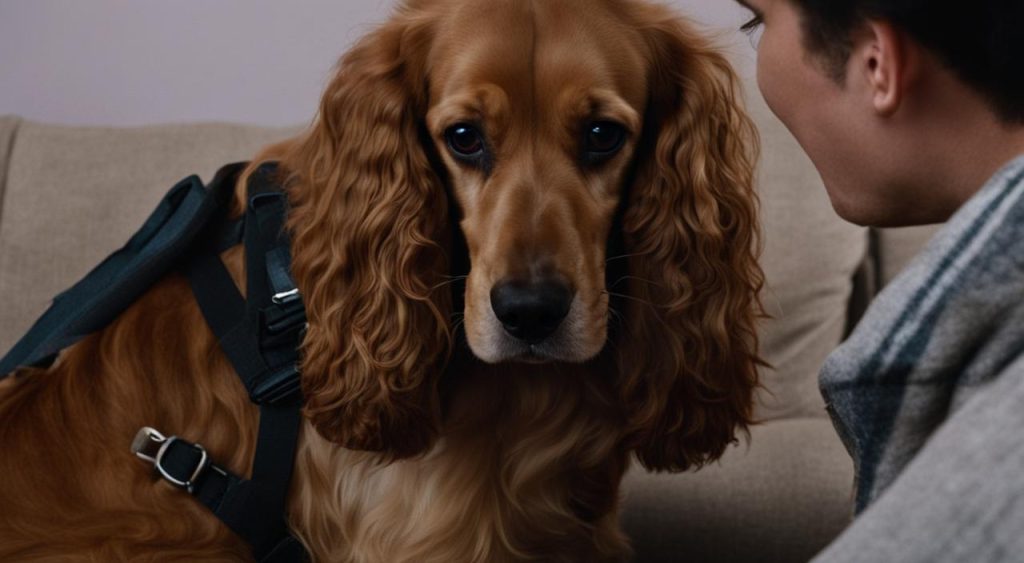Cocker Spaniels are known for their gentle, loyal, and loving nature, making them wonderful companions for owners. However, like any other breed, they can exhibit possessiveness in certain situations. It is important to understand the signs of possessiveness in Cocker Spaniels and learn how to effectively manage and prevent this behavior.
Cocker Spaniels are outgoing and sociable dogs that thrive on human attention. They have a natural hunting instinct and may display possessive behavior towards their food, toys, or even family members. However, not all Cocker Spaniels exhibit possessiveness, and it is more prevalent in specific individuals of the breed.
The good news is that possessiveness in Cocker Spaniels can be trained and managed through positive reinforcement and early socialization. By implementing consistent training methods from a young age, you can help your Cocker Spaniel understand boundaries and reduce possessiveness.
In the following sections, we will explore the temperament and personality of Cocker Spaniels, the importance of training and behavior management, and effective strategies for managing possessiveness in Cocker Spaniels.
Key Takeaways:
- Cocker Spaniels can exhibit possessive behavior towards food, toys, and family members.
- Not all Cocker Spaniels exhibit possessiveness, but it is more common in certain individuals of the breed.
- Proper training and socialization from a young age are crucial in managing possessiveness.
- Positive reinforcement is an effective method for reducing possessive behavior in Cocker Spaniels.
- Seeking guidance from a professional dog trainer or behaviorist may be necessary if possessiveness persists or becomes aggressive.
Cocker Spaniel Temperament and Personality
Cocker Spaniels are loving and outgoing dogs with a temperament that makes them loyal and affectionate companions. Their friendly and sociable nature makes them a great choice for families looking for a furry friend.
One of the standout traits of Cocker Spaniels is their love for human attention. They thrive on being around their family members and enjoy being a part of the household activities. Whether it’s cuddling on the couch or going for a walk in the park, these dogs are always eager to be by your side.
“Cocker Spaniels are intelligent and eager to please, making them highly trainable dogs.”
Cocker Spaniels are well-known for their intelligence and eagerness to please their owners. This makes them highly trainable and responsive to positive reinforcement methods. With consistent training and socialization, you can teach them various commands and ensure they grow up to be well-behaved companions.
However, it’s important to note that Cocker Spaniels can also have a stubborn streak. If not properly trained and socialized, they may exhibit strong-willed behavior. Therefore, early training and consistent reinforcement are essential for them to develop into their best selves.
Overall, Cocker Spaniels possess a temperament that encompasses traits such as loyalty, affection, sociability, and intelligence. These qualities make them excellent family pets and cherished companions for individuals or households of all sizes.
Training and Behavior
When it comes to training Cocker Spaniels, positive reinforcement is key. These highly intelligent dogs respond well to rewards and praise for desired behaviors. Avoid using force or punishment as it may harm their sensitive nature.
Short training sessions throughout the day are more effective than long, exhausting sessions. Cocker Spaniels have a limited attention span, so keeping sessions brief ensures they stay engaged and focused.
It’s crucial to be aware of their strong hunting instinct. Cocker Spaniels may become alert and excited in the presence of birds or small animals. To prevent them from chasing after prey, always keep them on a leash when outdoors.
Cocker Spaniels can sometimes exhibit possessive behavior, particularly when it comes to food, toys, and family members. Early training and socialization play a significant role in curbing and correcting this behavior.
Engage in activities that promote sharing and positive interactions. Encourage your Cocker Spaniel to share their toys and gradually introduce other family members into playtime. This helps them understand that possessions and attention can be shared freely.
By focusing on positive reinforcement, understanding their behavior traits, and being mindful of their hunting instinct, you can train and shape the behaviors of your Cocker Spaniel effectively.
Managing Possessiveness in Cocker Spaniels
To manage possessiveness in Cocker Spaniels, it is important to start training and socialization from a young age. This helps establish good behavior patterns and prevent possessiveness from developing. Positive reinforcement methods, such as rewards and praise, should be used to encourage desirable behavior and discourage possessiveness.
Creating a consistent routine and setting clear boundaries is also crucial. Cocker Spaniels thrive on structure and knowing what is expected of them. By providing consistent rules and expectations, you can help prevent possessive behavior from arising.
When dealing with possessive behavior, it is important to avoid confrontational methods or forcefully taking away objects from the dog. This can escalate the behavior and potentially lead to aggression. Instead, try redirecting their focus and rewarding them for giving up the object. Aversion therapy, such as using a command to release an object and rewarding them for complying, can be effective in redirecting possessive behavior.
Involving all family members in the care and interaction with the dog can also help prevent possessiveness toward a specific person. This ensures that the dog receives attention and affection from multiple sources, reducing the likelihood of possessive behavior developing towards one individual.
If possessiveness persists or becomes aggressive despite your efforts, it is highly recommended to seek guidance from a professional dog trainer or behaviorist. They can provide expert advice and create a customized behavior modification plan specific to your Cocker Spaniel’s needs.
By taking proactive measures, providing proper training and socialization, and seeking professional guidance when necessary, owners can effectively manage possessiveness in Cocker Spaniels. This enables a harmonious relationship based on trust, love, and respect.





